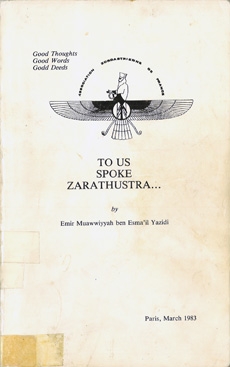|
A PRAYER
O Almighty, the Unique God
Creator of Earth and Heavens
Thou givest meat to both Man and Beast
Thou givest us meat alongside all others.
Unique One, Thou art the Only Truth
Thou art the only Light.
Thou hast created Tavous-Malak
From Thine Own Fire;
And Thou hast given us Zarathustra
As Guide.
We thank Thee
For Having made us
The Azda’ee nation.
Introduction
It is now more than six months that I am in exile, far from the land of my ancestors and where my people continue to suffer because of their Faith and their belief in peace and brotherhood as supreme values. I am not a politican. My people wanted me to choose temporary exile in order to make their voice heard in the civilised world. They knew that their prince was, in fact, their servant. So, they chose me for a mission and a task.
My people, the Azda’ees, are more commonly known as the Yazidis. For at least 14 centuries they have been subject to systematic persecution aimed at forcing them to abandon their Faith. The Azda’ees have been victims of a great conspiracy of silence - not only by proseletysers of all established religions in the region but also by those whose acclaimed business was to study our land and peoples and tell the world the truth about us.
I note all this without recrimination - merely to recall facts and to focus an attention on an omission which, God willing, shall be corrected. One of the first lessons a Yazidi learns is to aspire after the blessings of forgiveness. For we believe that every man shall reap what he has sown and that the one and the only creator is fully aware of every man’s thoughts, words and deeds.
My heart has been warmed by the reception I have been given wherever I became a visitor during this exile. It was partly the goodwill with which I was met that encouraged me in preparing these humble notes which, I sincerely hope, will be considered as an extended hand of friendship, an invitation to brotherhood and a greeting in peace.
That these notes are published at this particular time is, I believe, a good omen. For before the end of this month believers throughout the world shall be celebrating Now-Ruz, the feast of spring and our ancestral New Year, to be followed by celebrations marking the anniversary of Zoroaster’s birth.
The message of Now-Ruz is a message of hope and regeneration. And the message of Zoroaster was a message of salvation through good thoughts, good words and good deeds.
It is my sincere hope that our humble efforts shall be met with the same spirit of friendship and understanding I have so far experienced. We want people of all Faiths to recognise us and to accept us as a distinct religious community which, with some justice, can claim to be the oldest in the world.
It is my earnest wish that the Yazidis would soon succeed in setting up their first ever temple in Europe so that members of the Faith and all those interested in our beliefs and traditions can have a permanent forum. The temple, which shall have a library and other facilities required for study and meditation, will be administered by an association we are setting up in France.
For centuries my people were forced into silence - at times even to the point of disguising their true identity. Now we are declaring our Faith with dignity and honour, upholding our beliefs and traditions and assuming the full responsibility of being Azda’ees.
We have been the voiceless people of an unhappy region ; help us make our voice heard after centuries of enforced silence. We cry out for justice and humanity in a region where the sound of canons roars supreme ; help us achive what every human being deserves as a right.
We are on the side of life and hope in a region where death and desolation go hand in hand; help us to keep alight the eternal flame that gives the living the courage to abide in adversity.
Muawwiyyah ben Esma’il Yazidi
Paris, March 1983.
The Picture in the Wooden Frame
I was born in Sinjar, a fairly large village some 100 kilometres west of Mosul, an ancient city with a turbulent history of rise and fall.
My father, like his fathers since time immemorial, belonged to a stratum of our rural society assigned to performing the task of religious guide and community leaders. He was called Emir, Which means both Commander and Prince, but, as I soon learned, this mainly denoted the greater burden of responsibility he had to bear in the service of his people.
Our stone and mud-house in Sinjar was almost completely devoid of all that could be described as superficial and ornamental. It was built in such a way as to be constantly blessed by sunshine. Right from the start the sun was more present to us than the earth itself. Light, fire and warmth were key symbols in our Faith and the sun represented all three par excellence.
The mantlepiece in the main reception room in our house was adorned with a single framed painting. This was the portrait of a man, sporting a long beard and wearing a headgear that looked like a cross between royal crowns and priestly turbans of the Orient.
His eyes gazed at us constantly, keeping a watch on all we said and did. And, at times, I even felt that he saw what we were thinking as well. In the room no one paid any special attention to the ’’man” in the wooden frame. There was no ritual veneration of him. At the same time, however, it was evident that everyone, including my …
| 